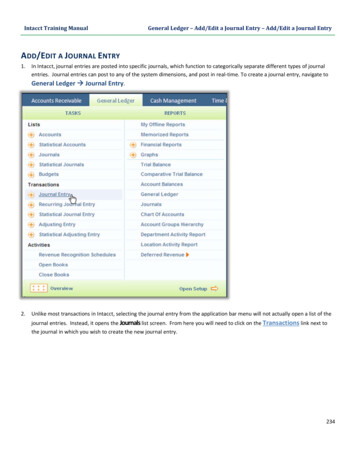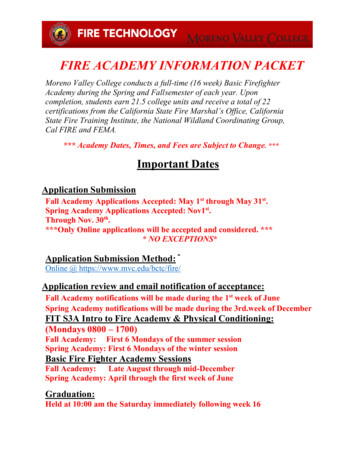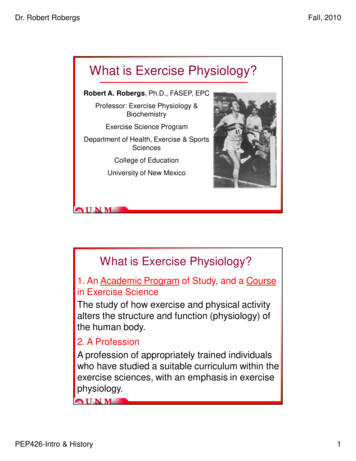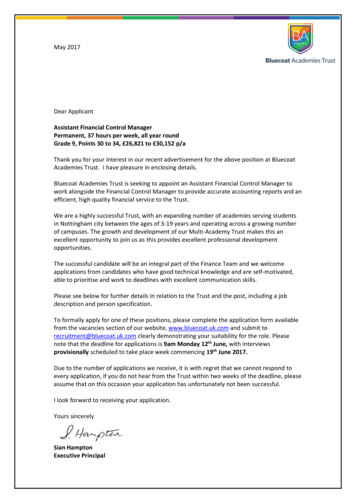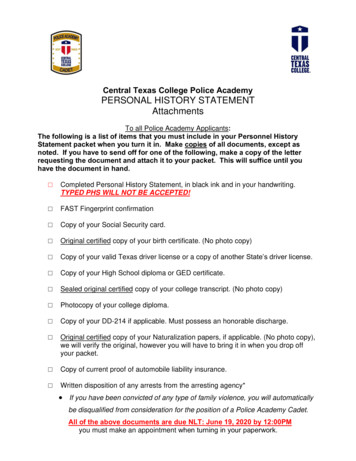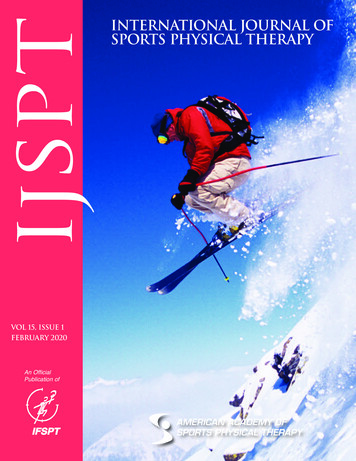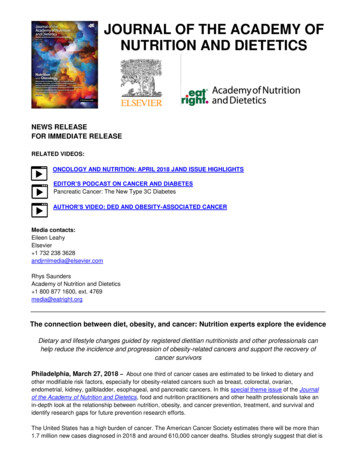
Transcription
JOURNAL OF THE ACADEMY OFNUTRITION AND DIETETICSNEWS RELEASEFOR IMMEDIATE RELEASERELATED VIDEOS:ONCOLOGY AND NUTRITION: APRIL 2018 JAND ISSUE HIGHLIGHTSEDITOR’S PODCAST ON CANCER AND DIABETESPancreatic Cancer: The New Type 3C DiabetesAUTHOR’S VIDEO: DED AND OBESITY-ASSOCIATED CANCERMedia contacts:Eileen LeahyElsevier 1 732 238 3628andjrnlmedia@elsevier.comRhys SaundersAcademy of Nutrition and Dietetics 1 800 877 1600, ext. 4769media@eatright.orgThe connection between diet, obesity, and cancer: Nutrition experts explore the evidenceDietary and lifestyle changes guided by registered dietitian nutritionists and other professionals canhelp reduce the incidence and progression of obesity-related cancers and support the recovery ofcancer survivorsPhiladelphia, March 27, 2018 – About one third of cancer cases are estimated to be linked to dietary andother modifiable risk factors, especially for obesity-related cancers such as breast, colorectal, ovarian,endometrial, kidney, gallbladder, esophageal, and pancreatic cancers. In this special theme issue of the Journalof the Academy of Nutrition and Dietetics, food and nutrition practitioners and other health professionals take anin-depth look at the relationship between nutrition, obesity, and cancer prevention, treatment, and survival andidentify research gaps for future prevention research efforts.The United States has a high burden of cancer. The American Cancer Society estimates there will be more than1.7 million new cases diagnosed in 2018 and around 610,000 cancer deaths. Studies strongly suggest that diet is
associated with cancer and that obesity increases the risk of many types of cancer as well as several chronicdiseases, including type 2 diabetes, cardiovascular disease, hypertension, and chronic inflammation.Key issue highlights:Obesity prevalence in the US has tripled over the last 50 years. In 2016, a report by the International Agency forResearch on Cancer highlighted that excess body fatness increases the risk for 13 types of cancer. Leadinvestigator Stephen D. Hursting, PhD, MPH, professor, Department of Nutrition, University of North Carolina atChapel Hill, and colleagues review the multiple mechanisms underlying the obesity-cancer link. Their detailedreview also assesses the dietary interventions that are being implemented in preclinical and clinical trials.Caption: Obesity is associated with increased risk of developing and dying from the following cancers: breast (inpostmenopausal women), ovarian, liver, gallbladder, kidney (renal cell), colon, pancreatic, gastric, esophageal(adenocarcinoma), endometrial, thyroid, multiple myeloma, and meningioma. Obesity is also associated with progression (butnot incidence) of prostate cancer.“Obesity-associated metabolic perturbations are emerging as major drivers of obesity-related cancer, includingalterations in growth factor signaling, inflammation, and angiogenesis,” explained Dr. Hursting. “Preclinicalevidence suggests that dietary interventions, such as calorie restriction, intermittent fasting, low-fat diet and theketogenic diet, have the potential to reverse some of these obesity-associated alterations; however, more clinicaldata are needed to confirm translation to human subjects.”A group led by Guido Eibl, MD, from the Department of Surgery, David Geffen School of Medicine at UCLA, onbehalf of the Consortium for the Study of Chronic Pancreatitis, Diabetes, and Pancreatic Cancer, reviews thecurrent knowledge pertaining to obesity and type 2 diabetes as risk factors for pancreatic ductal adenocarcinoma(PDAC), one of the deadliest cancers. Although the risk factors promoting PDAC development have been knownfor several decades, their underlying molecular mechanisms and interactions have just recently begun to be
explored. The article highlights the risk factors for PDAC development and progression, their interplay andunderlying mechanisms, and the relation to diet, and outlines research gaps and opportunities.High quality epidemiologic studies associate obesity with an increased risk of PDAC, however, there are manyunanswered questions. For example, the beneficial effects of weight reduction and bariatric surgery on improvinginsulin resistance are known, but their role in decreasing PDAC incidence is still essentially unknown.“Altogether, given the high mortality of PDAC and the expected increase in obesity and diabetes over the next fewdecades, efforts should be undertaken to mechanistically understand the link between obesity, diabetes, andPDAC. Preclinical animal models are available that will facilitate the study of these important interactions toadvance our knowledge, so that the obesity- and diabetes-driven burden of PDAC can be curbed,” commentedDr. Eibl.Consumption of dietary energy density (DED) has been associated with weight gain in adults. DED is the ratio ofenergy (kilocalories or kilojoules) intake to food weight (grams) and is a measure of diet quality. Cynthia A.Thomson, PhD, RD, professor, Mel and Enid Zuckerman College of Public Health, The University of Arizona, andcolleagues present results of an investigation into the association between baseline DED and obesity-associatedcancers in over 90,000 postmenopausal women enrolled in the observational study or the calcium and vitamin Dtrial and hormone replacement therapy trials of the Women’s Health Initiative. Investigators found that DED wasassociated with higher risk of any obesity-related cancer. Of note, the higher risk was restricted to women withnormal BMI.“The demonstrated effect in normal-weight women in relation to risk for obesity-related cancers is novel andcontrary to our hypothesis,” remarked Dr. Thomson. “This finding suggests that weight management alone maynot protect against obesity-related cancers if women favor a diet pattern indicative of high energy density. HigherDED in normal-weight women may promote metabolic dysregulation independent of body weight, an exposureknown to increase cancer risk.DED is a modifiable risk factor. Nutrition interventions targeting energy density as well as other diet-related cancerpreventive approaches are warranted to reduce cancer burden among postmenopausal women.In a pilot intervention among 46 cancer survivors aged 60 years or older, Wendy Demark-Wahnefried, PhD, RD,professor of Nutrition Science, University of Alabama at Birmingham, and colleagues, posed the question ofwhether a home vegetable gardening intervention was feasible among older cancer survivors, and whether it wasassociated with improvements in diet and other health-related outcomes. Participants were randomized to receivea year-long vegetable gardening intervention immediately or to a wait-list control arm.Investigators found the gardening intervention was well accepted, safe, and feasible and also significantlyimproved reassurance of worth and reduced gains in central adiposity. Data also suggested that it increasedvegetable and fruit consumption by approximately one serving per day.“Results suggest that future larger studies are warranted. A fully powered randomized controlled trial is currentlyunderway and recruiting 426 older cancer survivors across Alabama,” noted Dr. Demark-Wahnefried.Nancy J. Emenaker, PhD, MEd, RDN, LD, and Ashley J. Vargas, PhD, MPH, RDN, both registered dietitiannutritionists from the National Institutes of Health, review the scientific evidence linking diet and cancer. Theyexplain the inconsistencies in the nutrition and cancer scientific literature and the issues that registered dietitiannutritionists (RDNs) face when translating this complex information for patients.“RDNs are uniquely positioned to provide balanced, evidence-based information from peer-reviewed literature tohelp at-risk and cancer patients understand the strength of the evidence guiding individual health decisions,”observed Dr. Emenaker and Dr. Vargas. “Despite the best efforts of nutrition science researchers, inconsistenciesexist across the diet-cancer prevention scientific literature. Clinical trials are the gold standard of research, but the
body of scientific data should be compelling before translating scientific findings to our at-risk, presumed healthypatients for disease prevention and patients with a good prognosis undergoing treatment.”“RDNs play such an important role in both cancer prevention and cancer care. Our profession is involved inresearch to investigate diet-cancer relationships, as well as supporting individuals and communities in makinglifestyle changes for cancer prevention and treatment. RDNs are integral in providing quality care by implementingevidence-based interventions,” added Linda Snetselaar, PhD, RDN, LD, endowed chair and professor,Department of Epidemiology, College of Public Health, University of Iowa, and Editor-in-Chief of the Journal of theAcademy of Nutrition and Dietetics.--Notes for editorsThe articles are:“Translating Mechanism-Based Strategies to Break the Obesity Cancer Link: A Narrative Review,” by Laura A.Smith, MPH, RD; Ciara H. O’Flanagan, PhD; Laura W. Bowers, PhD, RD; Emma H. Allott, PhD; and Stephen D.Hursting, PhD, MPH (DOI: https://doi.org/10.1016/j.jand.2017.08.112)Author contact: Stephen D. Hursting at hursting@email.unc.edu“Diabetes Mellitus and Obesity as Risk Factors for Pancreatic Cancer,” by Guido Eibl, MD; Zobeida CruzMonserrate, PhD; Murray Korc, MD; Maxim S. Petrov, MD, PhD, MPH; Mark O. Goodarzi, MD, PhD; William E.Fisher, MD; Aida Habtezion, MD; Aurelia Lugea, PhD; Stephen J. Pandol, MD; Phil A. Hart, MD; and Dana K.Andersen, MD or contact: Guido Eibl, at Geibl@mednet.ucla.edu“Association between Dietary Energy Density and Obesity-Associated Cancer: Results from the Women’s HealthInitiative,” by Cynthia A. Thomson, PhD, RD; Tracy E. Crane, PhD, RD; David O. Garcia, PhD; Betsy C.Wertheim, MS; Melanie Hingle, PhD, MPH, RDN; Linda Snetselaar, PhD, RDN; Mridul Datta, PhD, RD; ThomasRohan, MBBS, PhD, DHSc; Erin LeBlanc, MD, MPH; Rowan T. Chlebowski, PhD; and Lihong Qi, PhD, thor contact: Cynthia A. Thomson at cthomson@email.arizona.edu“Pilot Randomized Controlled Trial of a Home Vegetable Gardening Intervention among Older Cancer SurvivorsShows Feasibility, Satisfaction, and Promise in Improving Vegetable and Fruit Consumption, Reassurance ofWorth, and the Trajectory of Central Adiposity,” by Wendy Demark-Wahnefried, PhD, RD; Mallory G. Cases, PhD;Alan B. Cantor, PhD; Andrew D. Frugé, PhD, RD; Kerry P. Smith, MS; Julie Locher, PhD; Harvey J. Cohen, MD;Yuko Tsuruta, MD, PhD; Michael Daniel, Rishabh Kala, PhD; and Jennifer F. De Los Santos, r contact: Wendy Demark-Wahnefried at demark@uab.edu“COMMENTARY: Nutrition and Cancer Research: Resources for the Nutrition and Dietetics Practitioner,” byNancy J. Emenaker, PhD, MEd, RDN; and Ashley J. Vargas, PhD, MPH, hor contact: Nancy J. Emenaker at emenaken@mail.nih.govThey appear in the Journal of the Academy of Nutrition and Dietetics, volume 118, issue 4 (April 2018) publishedby Elsevier.For the complete table of contents visit http://jandonline.org/issue/S2212-2672(17)X0006-3. Full text of thesearticles is available to credentialed journalists upon request. Contact Eileen Leahy at 1 732 238 3628 orandjrnlmedia@elsevier.com to obtain copies.Information specifically for journalists is located at http://jandonline.org/content/media.
Related videosONCOLOGY AND NUTRITION: APRIL 2018 JAND ISSUE th%20Advance/journals/jand/jand ec 118 4.mp4EDITOR’S PODCAST ON CANCER AND DIABETES:Pancreatic Cancer: The New Type 3C Diabetes JAND Editor-in-Chief Linda Snetselaar, PhD, RDN, LD, FANDinterviews Dana K. Andersen, MD, with the National Institute of Diabetes and Digestive and Kidney Diseases.Drs. Snetselaar and Andersen discuss the physiological connection between cancer and diabetes, the differencebetween type 2 diabetes and type 3c, and the role of dietary intervention in th%20Advance/journals/jand/jand ec 118 4 a.mp4AUTHOR’S VIDEO: DED AND OBESITY-ASSOCIATED CANCERhttp://jandonline.org/pb/assets/raw/Health Advance/journals/jand/jand pr 117 8 1.mp4About the Journal of the Academy of Nutrition and DieteticsThe official journal of the Academy of Nutrition and Dietetics, the Journal of the Academy of Nutrition andDietetics is the premier source for the practice and science of food, nutrition, and dietetics. The monthly, peerreviewed journal presents original articles prepared by scholars and practitioners and is the most widely readprofessional publication in the field. The Journal focuses on advancing professional knowledge across the rangeof research and practice issues such as: nutritional science, medical nutrition therapy, public health nutrition, foodscience and biotechnology, food service systems, leadership and management and dietetics education.www.jandonline.orgAbout the Academy of Nutrition and DieteticsThe Academy of Nutrition and Dietetics is the world’s largest organization of food and nutrition professionals. TheAcademy is committed to improving the nation’s health and advancing the profession of dietetics throughresearch, education, and advocacy. www.eatright.orgAbout ElsevierElsevier is a global information analytics business that helps institutions and professionals advance healthcare,open science and improve performance for the benefit of humanity. Elsevier provides digital solutions and tools inthe areas of strategic research management, R&D performance, clinical decision support and professionaleducation, including ScienceDirect, Scopus, SciVal, ClinicalKey and Sherpath. Elsevier publishes over 2,500digitized journals, including The Lancet and Cell, 38,000 e-book titles and many iconic reference works, includingGray’s Anatomy. Elsevier is part of RELX Group, a global provider of information and analytics for professionalsand business customers across industries. www.elsevier.com
of the Academy of Nutrition and Dietetics, food and nutrition practitioners and other health professionals take an in-depth look at the relationship between nutrition, obesity, and cancer prevention, treatment, and survival and identify research gaps for future prevention research efforts. The United States has a high burden of cancer.



